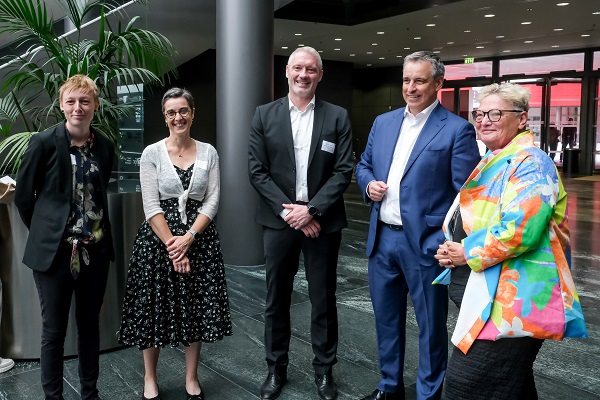 (L-R) Aline Schott, SFA; Françoise Chotro, SFA; Christian Buchler, SFA; Claude Meisch, Luxembourg's Minister of Education, Children and Youth; Elisabeth Vanderheiden, Katholische Erwachsenenbildung Deutschland;
Credit: MENEJ/SFA
(L-R) Aline Schott, SFA; Françoise Chotro, SFA; Christian Buchler, SFA; Claude Meisch, Luxembourg's Minister of Education, Children and Youth; Elisabeth Vanderheiden, Katholische Erwachsenenbildung Deutschland;
Credit: MENEJ/SFA
Luxembourg's Ministry of Education, Children and Youth has announced that it is launching a campaign on the occasion of International Literacy Day (8 September).
This campaign is aimed at adults "wishing to acquire the basic skills to read, write, calculate or navigate in an increasingly digitalised world".
The ministry noted that in Luxembourg, as in other European countries, it is estimated that 10-12% of adults do not have these skills. The campaign, led by the ministry's Adult Education Service (SFA), aims to motivate those concerned to register for the free courses offered by the SFA and to train in order to be better able to participate in professional and social life.
The campaign launched on Thursday 5 September 2023 during a thematic morning in Esch-Belval with more than 100 participants, in the presence of Luxembourg's Minister of Education, Children and Youth, Claude Meisch, and international experts.
The basic instruction courses in French, German or Portuguese are free and organised in the evening and in a decentralised way. They are available in Luxembourg-Kirchberg, Ettelbruck, Warken, Wiltz, Mersch, Echternach and Esch-Belval. Partner associations also organise courses in other municipalities.
The telephone number 8002-9999 has been set up for interested individuals, who will be guided by a specialised support worker. Requests are treated in a strictly confidential manner, added the ministry. Further information on basic education courses for adults can be found on the website: www.abcd.lu.
The ministry noted that basic education courses are provided by specialised and experienced trainers. During the first session, the trainer first takes stock of the learner's knowledge, then establishes a work programme based on the learner's personal goals and professional situation. The basic education trainers then accompany four to five learners in a "friendly" setting. They also adapt the teaching material to the individual needs of the learner.








